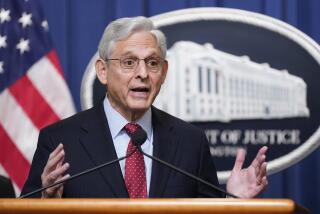Bush Backs Asbestos Tort Fund
- Share via
CLINTON TOWNSHIP, Mich. — President Bush on Friday threw his weight behind a congressional proposal to create an industry-financed trust fund to compensate tens of thousands of victims of asbestos-caused diseases, an effort to resolve the longest-running mass tort litigation in U.S. history.
But groups representing people suffering from asbestos-related illnesses said such a fund would be woefully inadequate and that the approach would hamper their ability to seek legal redress.
Bush’s endorsement of an asbestos litigation trust fund marked was the third time this week that he advocated far-reaching changes in the way lawsuits were handled.
The president has said that changing the legal system is a top priority for his second term, amid signs that Congress, with its enlarged Republican majority, may go along with his proposals to curb class-action lawsuits and impose limits on awards for pain and suffering in medical malpractice cases.
On Wednesday, Bush traveled to Madison County, Ill., to highlight his initiative to place a $250,000 cap on noneconomic damages in medical liability lawsuits.
A day later at the White House, he promoted a plan to channel class-action lawsuits into federal courts, which generally impose stricter standards for certifying such mass actions.
In calling for the broad changes, Bush said “frivolous and junk” lawsuits were costing the national economy $240 billion a year and putting the United States at a competitive disadvantage in the global marketplace.
Nearly all sides of the asbestos controversy concede that the legal system has been strained by three decades of litigation over it.
More than half a century ago, asbestos fibers were recognized for their potent fire-retardant properties, and thus were quickly incorporated into a wide variety of products, including those found in cars, ships, office buildings, homes and schools.
But scientists, including some at the asbestos manufacturers, learned that asbestos fibers could be easily inhaled and were a powerful carcinogen.
The first wave of personal injury suits was filed in the 1970s, with about 300 companies that manufactured or used the fire-retardant materials as defendants.
But because asbestos injuries can take decades to become apparent, such personal injury lawsuits later exploded.
According to researchers at the Rand Institute for Civil Justice, a typical plaintiff two decades ago named 20 firms as defendants; today, there are 60 to 70 defendants per lawsuit. In all, some 6,000 corporations are being targeted.
Further complicating matters, insurance companies have engaged in a torrent of litigation against one another, trying to shift the blame. So have asbestos manufacturers.
Rand found in 2002 that claimants received 43 cents for every dollar spent on asbestos litigation, with the rest going to lawyers and other transactional costs. The study also found that more than 600,000 people had filed claims for compensation for asbestos-related injuries.
To highlight the problem, Bush employed one of his favorite formats for campaigning for his initiatives. On a stage at Macomb Community College, he shared the spotlight with four guests whose experiences illustrated aspects of what Bush called “a national problem.”
The president said that those injured deserved fair compensation, but he added that a proliferation of unjust claims was clogging the nation’s legal system, preventing the meritorious cases from being heard.
The president said “the vast majority of claims” were being filed by those with no major medical impairment.
The heads of two manufacturers spoke about being barraged by asbestos lawsuits that they said had little or no merit.
Consumer groups chided Bush for conducting what they regarded a “one-sided” conversation, in the words of Frank Clemente, director of Public Citizen’s Congress Watch.
The Asbestos Disease Awareness Organization, made up of asbestos victims and their families, demanded to be heard in the debate.
“The asbestos industry must be held accountable for its actions.... It is unacceptable for meetings to be held with industry, the companies and all of the corporate interests who would benefit from the asbestos industry bailout bill, and not those who suffer as a result of asbestos exposure,” the group said in a statement.
More to Read
Sign up for Essential California
The most important California stories and recommendations in your inbox every morning.
You may occasionally receive promotional content from the Los Angeles Times.










